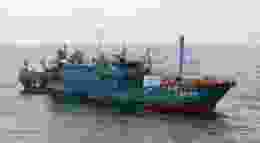
Shifting sands in the Western Sahara
Despite nearly 30 years of truce, conflict has sparked again in Western Sahara as the Polisario Front declares war on Morocco. The international community must play their part to ensure this conflict does not escalate, and push for resolutions to be made peacefully, argues Joseph Hammond.
The situation and line of control over a long sand berm in the Sahara may seem obscure but the brewing conflict in Western Sahara is deserving of more attention both from the United Kingdom and the broader international community. Polisario is a leftist guerrilla organization which has long advocated for the independence of the region. Now that group has declared war on Morocco despite a nearly 30-year ceasefire and hard work from the United Nations to ameliorate the conflict.
Some 300 British forces are currently in Mali where they are part of an international mission to provide stability to that country. In that context any destabilization of the Greater Sahara region is unwelcome. The situation should also be considered in the broader context of narco-terrorism nexus in the Sahel. Western Sahara's porous border is increasingly a gateway for illegal narcotics to reach Europe, an issue both Morocco and Polisario have raised concerns over. However, the ability to control porous desert border would stretch the resources of any state let alone an armed non-state actor like Polisario.
Yet, it is the trade of the more traditional kind, not narcotics, which has sparked the current conflict. In October, Polisario imposed a unilateral blockade on traffic across the thin strip of territory near the village of Guerguerat it controls. The location is a crucial spot for trade between Morocco and Mauritania. Some 200 trucks destined for Morocco were stranded for weeks as a result. While the checkpoint blockade was meant to impact Morocco, it is worth noting that such cross-border trade affects the food security of not just Morocco but, Mauritania, Burkina Faso, Côte d'Ivoire, Niger and Mali.
This act which the United Nations referred to as a "freedom of movement violation" was staged to block trade between Morocco and was one of several such provocations in recent months. Polisario's strategy in doing so may have been to provoke an overreaction from Morocco and therefore draw international attention to their cause. Though a sporadic exchange of gunfire occurred, no one was injured in a November 13th operation launched by the Moroccan military to clear the barricades. Yet, it served as a pretext for Polisario to declare war. In reality, this crisis has been brewing for months. In January, Polisario threatened to disrupt the automotive Africa Eco Race that passed through its territory and involved British competitors. A little-noted United Nations report in October reprimanded Polisario and called for a one-year extension of the peace-keeping mission to Western Sahara known as Minurso. The report noted that:
"East of the berm, there was a significant deterioration in cooperation by the Frente Polisario military forces. They regularly denied Minurso patrols entry into most of their units, as well as to specific areas and sites in the second and fifth military regions, in repeated violation of military agreement No. 1."
That report further states that while Morocco has committed single freedom of movement violation, Polisario forces committed 40 such provocations during the reporting period.
It is worth noting that the United Kingdom is not currently a contributor to the Minurso mission but, a large number of Commonwealth countries have contributed troops, military observers or civilian police – notably Bangladesh.
The origin of the conflict in Western Sahara dates to the Spanish colonial policy of divide and rule. In 1975 Polisario, a Marxist and the Kingdom of Morocco, had enjoyed a truce since 1991. Polisario controls a thin strip of land. Morocco has built a sand berm between this section – the rest of the country which it patrols and reinforces.
Moroccan King Mohammed VI spoke with UN Secretary-General Antonio Guterres following the recent clashes to express that his country remains committed to the ceasefire agreement.
Until this past week, there have been no sustained clashes between the two sides since 1991. However, landmines deployed by both sides remained a threat to both parties as well as Minurso observers.
Though it is hard to remember now, Polisario was once cause célèbre during the Cold War for Marxists the world over. The dream of an independent Sahara under a socialist government might still inspire a few supporters, and the Venezuelan governments have pledged support for Polisario in the context of the current crisis. Yet, while Algeria remains committed to its cause, many of its long-term friends are increasingly reluctant to support it. The international community should take note of this trend and an isolated Polisario could react in dangerous ways.
Indeed, the international community has a clear obligation to ensure that Polisario's frustrations do not lead to open conflict and to ensure both sides abide by the 1991 ceasefire agreement. The situation cannot be resolved across a sand berm, but across a negotiation table.

Joseph Hammond is a journalist and former Fulbright Public Policy fellow with the government of Malawi. Hammond has been a recipient of fellowships organized by several think tanks, including the National Endowment for Democracy, the Atlantic Council of the United States, the Heinrich Boll Stiftung North America Foundation, and the Policy Center for the New South’s Atlantic Dialogue.






